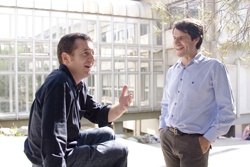study
Master Programs Offer Students Tools to Succeed in the New Financial Landscape

Students who undertake graduate level study in the coming year face a new financial landscape. Profs. Xavier Freixas, Albert Marcet, and Juan Carlos Conesa discuss how the GSE Master programs are preparing a new wave of graduates to succeed in the emerging economic climate.
Why Study Finance During the Crisis?
The average BSE student is 25 years old, meaning that the current financial crisis is likely the only, and probably the worst, that they have seen in their lifetime. The changing financial circumstances of the world dictate that new measures are taken to both regulate and reform financial institutions.
“What the crisis tells us is that the regulatory measures that we had in place were not the right ones to handle the events that we have witnessed,” says Prof. Xavier Freixas (UPF-GSE), Director of the Master in Finance. “This means that in the next year there will be an increased demand for people to work in central banks and regulatory agencies, and that these people will need to have the skills to understand what banks, financial agencies, and complex leverage entities do, as well as how to regulate them.”
Juan Carlos Conesa (UAB-GSE), Deputy Director of the Master in Macroeconomic Policy and Financial Markets, shares this view. “Nowadays the world is going through a serious financial crisis, whose depth and duration is far from being clearly understood. Studying the causes and nature of this ongoing crisis, together with the analysis of previous episodes, represents a step in the right direction. We need rigorous thinking based on theoretical and empirical analysis, and the MSc in Macroeconomic Policy and Financial Markets provides you with the appropriate tools for that.”

Professors Juan Carlos Conesa (left) and Albert Marcet, Directors of the Master in Macroeconomic Policy and Financial Markets, at the Bellaterra campus of the BSE
Out with the Old, In with the New
Albert Marcet (IAE-GSE), Director of the Macroeconomic Policy and Financial Markets program, says “What we have seen from the downfall of many financial institutions is that there was a widespread ignorance among financial analysts as to why specific models were being used. Simply understanding how to use a certain model is not enough—the new economic times call for professionals who have a greater understanding of the factors involved in creating the model in the first place.”
As a result of the crisis, hiring managers at banks and financial institutions now have a renewed interest in recruiting graduates with knowledge of the “hows and whys” behind the tools they learn. In sum, says Prof. Marcet, “Not only are financial institutions seeking professionals who know how to use the latest models, but they are looking for professionals who have an deep understanding of why they are used.”
Adapting to the changing financial climate, in the 2009-2010 academic year, the MSc in Finance will offer a new Banking Profile, which will not only equip students with stochastic tools, but will offer courses in Managing Financial Institutions, Theory of Banking, and Risk Management. These new adaptations reflect the BSE’s commitment to providing academic rigor and delivering the deep and versatile knowledge and expertise necessary for students’ professional success.

Students in the 2007-2008 Master of Finance at the graduation ceremony at CaixaForum with Program Director Xavier Freixas and Prof. Andreu Mas Colell, Chairman of the GSE
The Demand for Knowledgeable Analysts
“The lesson of the crisis is that we need, not necessarily more regulation, but definitely better regulation,” says Prof. Freixas. “To achieve that, we need people who are equipped with the tools to understand and design better regulation practices. Precisely, the tools offered in rigorous Master programs—like those at the GSE—provide a good theoretical or stochastic background and the skills to succeed in a financial institution.”
According to Prof. Conesa, “Graduates with this understanding will be in high demand in government agencies, central banks, and regulatory institutions, all of which will be recruiting fresh faces and ideas in the coming years.” There will be a skill premium for individuals be able to think deeply about what banks do, what is their role in society, and how to prevent economic debauchles and improve the current economic situation.
Nowadays, more than ever, the value of a good central bank or regulatory institution is determined by the value of the team they count on. “For a young, ambitious person to take a year to make a huge investment in his human capital signals that he expects to be in charge and take responsible, informed decisions within a team,” says Prof. Freixas. “This is the essential value of investing in finance studies at the graduate level, and why graduates from the GSE Master programs will continue to form part of an elite contingent of people with the knowledge to understand the financial landscape and the tools to improve it.”

Xavier Freixas, Director of the UPF-GSE Master in Finance
